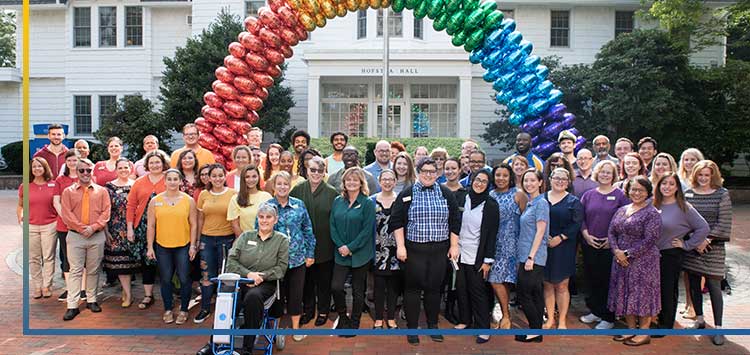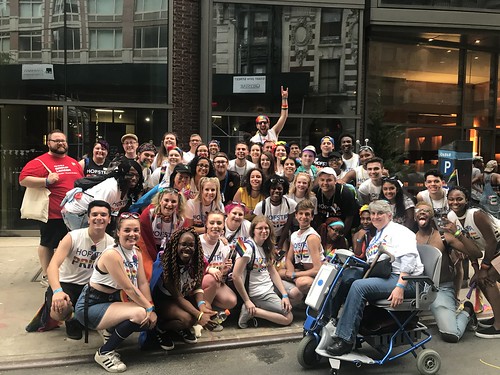Sexual Identity: They Ain’t What They Used to Be
4th Annual LGBTQ+ Symposium – Hofstra University
March 5-6, 2010
Judith S. Kaufman and David A. Powell, directors
For an issue in early 2004, the Gay and Lesbian Review, a scholarly journal, asked several senior gay statesmen to reflect on developments during the previous decade. Most sound unhappy with how things are going. Historian Martin Duberman feels compelled to castigate modern gay men and lesbians as wanting to be “just folks,” to simply fit in. “Rather,” writes Duberman (2004), “they should be demanding a radical analysis of contemporary culture. Where is the Gay Liberation Front of 1970 now that we need it?” he asked (p.22). Similarly, novelist Sarah Shulman (2004), a founder of the Lesbian Avengers, bemoans the lack of an activist movement among young people. “Youth,” she says, “are being duped into conformity because they believe the media’s representation of their lives.” (Savin-Williams, 2005)
Savin-Williams goes on to question whether duping has really occurred and wonders whether “young people with same-sex desires are basically content with modern culture and don’t desire a critical analysis” (p. 194). Is the furor over proposition 8 in California the last gasp of conservatives who understand that the LGBTQ+ community may be joining the status quo? Are young people with same-sex desires redefining the parameters of sexual identity? Are identity politics still relevant in the 21st century? Are the characteristics of fluidity, ambisexuality, and a reluctance to label sexuality (Entrup & Firestein, 2007) more appropriate for describing young people with same-sex desires? Has the narrative of emancipation replaced the narrative of struggle and success (Cohler and Hammack, 2007) that so defined the literature on LGBTQ+ youth in the 1980’s and 1990’s? Is sexual orientation becoming irrelevant (Hattersley, 2004)?
The directors seek to open up a dialogue relating to the shifting consciousness of LGBTQ+ youth and the viability of a continued “gay movement.” Topics of a political, sociological, developmental and psychological, anthropological, pedagogical, or historical nature as well as commentary on literary and cinematic representations of the shifting nature of the gay “community” are welcome.
Schedule of Events
Friday, March 5
9:00 Breakfast
10:00 Amy Shema, Warner Graduate School of Education, University of Rochester – “Schools as Social Institutions: Perpetuating the Status Quo”
10:45 Nicole Sieben, School of Education, Adelphi University – “The Positive Impacts of Teaching LGBTQ+ Issues in the Secondary Classroom”
11:30 Jennifer M. de Coste, Institutional Diversity Initiatives, Clarkson University – “Toward a Theory of Rural Queer Studies”
12:15-2:00 Lunch
2:00 Welcome Remarks
2:30 Thomas O. Haakenson, Dept. of Liberal Arts, Minneapolis College of Art and Design – “Sexual Disorientation, Queer Space: The Art of Michael Elmgreen and Ingar Dragset”
3:15 Tamara Powell, College of Humanities and Social Sciences, Kennesaw State University – “Is Anybody Wicked Anymore? Or, Are We Ourselves?”
4:00 Alexandar Mihailovic, Comparative Literature and Languages, Hofstra University – “Gay and Blue: The Language for Same-Sex Desire in Putin and Medvedev’s Russia”
4:45 Christian Fuscarino and Anthony Crisci, Pride Network, Hofstra University – “Fag Is Not My Identity: Knock It Off!”
7:00 Performance by Alec Mapa, a well-known American-Filipino comic who has had recurring roles on Ugly Betty, Desperate Housewives and Sex and the City.
8:30 Buffet Dinner
Saturday, March 6
10:15 Breakfast
11:00 Ritch C. Savin-Williams, Human Development, Cornell University – “The New Gay Teenager: A Revolution in the Making?”
12:15-2:00 Lunch
2:00 Todd L. Pittinsky, JFK School of Government, Harvard University – “Beyond Rejection and Acceptance: Allophilia and ‘Straight Ally’ Attitudes and Behaviors”
2:45 Robin P. McHaelen & Kamora L. Herrington, True Colors Inc., Sexual Minority Youth and Family Services, Farmingdale, NY; and Cheryl A. Parks, School of Social Work, University of Connecticut – “So, Not Only Am I Queer, I’m Not Even Good at It? A Community Provider’s Perspective on the Shifting in ‘Single’ Consciousness of LGBTQ+ Youth”
3:30 Thomas J. Balcerski, Department of History, Cornell University – “Risking the Lives of Youth?: Troubled Sexuality in Youth Organizations from the BSA to the YMCA”
4:15 Darla L. Linville, Education Program, Colby College – “Becoming Sexual and Gendered Subjects: The Identities Young People Claim and the Freedoms Within Them”
5:00 Richard Canning, English Literature, Bishop Grosseteste University College, UK – “Contemporary Gay Identity and the Syndrome that Never Was”
7:00 Buffet Banquet
Please send proposals to Judith S. Kaufman AND David A. Powell at Judith.s.kaufman@hofstra.edu and david.powell@hofstra.edu no later than October 15, 2009. Papers will be limited to 20-minute presentations. Selected papers will be published in volume form.



